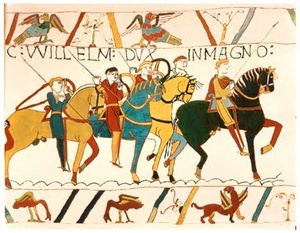I've forgotten a lot of what I learned (it was over 20 years ago, after all. Which reminds me - in October, it will be 20 years since I arrived in Ireland!), but I remember a few buzz words.
Here is a buzz word to impress: "the great vowel shift". It refers to a period where the pronunciation of vowels in English changed completely, around the 14th & 15th century. I had forgotten a lot about it, but Wikipedia has plenty of interesting information. During the vowel shift, the pronunciation of /a:/ (like in the word "father") changed to /ei/ (like in the word "make" for instance).
 Another important time in the history of the English language was 1066 (Battle of Hastings), when William of Normandy arrived in England, and brought the French language to the court - that's when all the fancy French words came into the English language.
Another important time in the history of the English language was 1066 (Battle of Hastings), when William of Normandy arrived in England, and brought the French language to the court - that's when all the fancy French words came into the English language.And that's why there are 2 words for a lot of things in English. For instance, a calf grazes in the field, whereas veal is what ends up on the plate. The word calf comes from an Old English word, whereas veal comes from an Old French word, which in Modern French has given us the word veau.
In French, we often only have one word for the live animal and for the cooked meat. English often has two - a word from Old English for the live animal and a word acquired from French for the cooked meat: for instance: calf/veal, pig/pork, sheep/mutton.
Generally, a lot of the French words that came into the English language after 1066 are associated with the Court - food, finer things in life, etc... Somehow, they feel more lofty, but not quite as real.
One pairing I remember from college was "hearty welcome" vs "cordial reception".
And that's all without talking about Indo-European roots and all the connections that can be made between various languages. I must tell you about the Indo-European root "pag". How did the words "page", "peasant", "peace", "impale", "propagate" and "travel" all come from this little root? I'll tell you all about it next time!
No comments:
Post a Comment